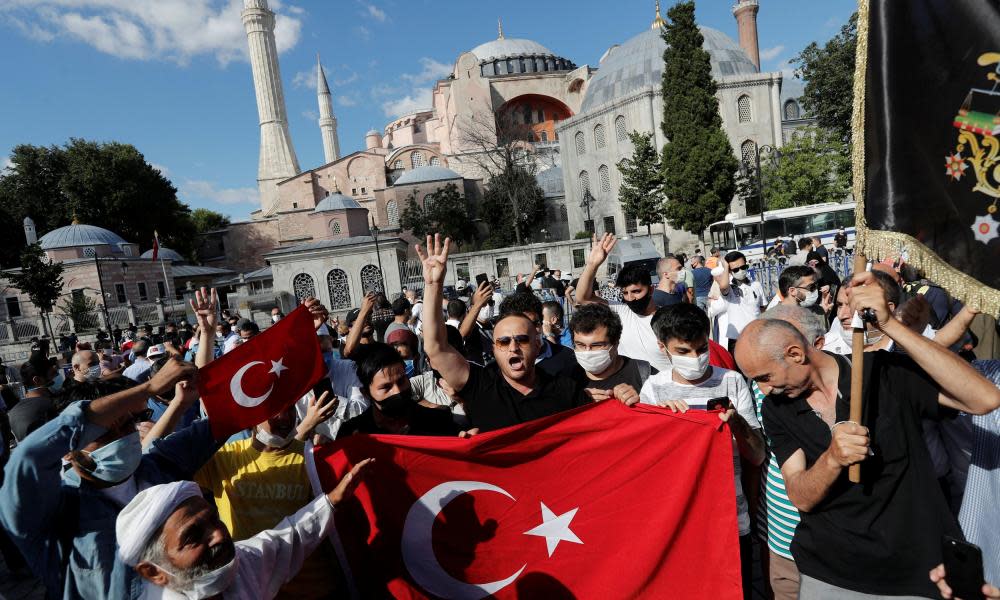Court ruling paves way for Istanbul's Hagia Sophia to revert to mosque

Turkey’s president, Recep Tayyip Erdoğan, has formally converted Istanbul’s crowning architectural jewel, the Hagia Sophia, from a museum into a mosque – a politically charged decision that has drawn international criticism but delighted his conservative base.
Turkey’s highest administrative court, the Council of State, paved the way for the move after it ruled unanimously on Friday to annul a 1934 cabinet decree that stripped the 1,500-year-old building of its religious status.
Erdoğan signed a presidential decree turning the hugely symbolic site back into a Muslim house of worship almost immediately after the ruling was announced.
Related: Hagia Sophia: the mosque-turned-museum at the heart of an ideological battle
Members of his ruling Justice and Development party (AKP) greeted the decree with a standing ovation in parliament, and the call to prayer was recited from the building’s minarets on Friday afternoon while supporters celebrated outside.
The Unesco-listed Hagia Sophia (Divine Wisdom), known in Turkey as Ayasofya, was completed in 537AD by the Byzantine emperor Justinian, and for centuries served as one of the world’s most important centres of Christianity.
The cathedral was converted into an imperial mosque 550 years ago after the Ottoman conquest of Constantinople, and then became a museum on the orders of Mustafa Kemal Atatürk, the founder of the Turkish Republic.
The status of the world heritage site has been debated for decades by Christians, Muslims and those who believe in preserving the Turkish state’s secular principles.
Friday’s ruling was the outcome of a case brought by a religious group that has campaigned for years to restore the Hagia Sophia’s Muslim heritage. It questioned the legality of Atatürk’s decision, telling the court that the building was the personal property of Ottoman Sultan Mehmed II, who conquered Istanbul in 1453, and that a foundation managing the sultan’s assets originally opened the site to the public as a mosque.
Erdoğan, who has championed Islamic values during his 17 years in power, publicly took up the cause last year in an effort to shore up waning support for his government coalition.
Recent polling by a pro-government newspaper found that 73% of Turks were in favour of converting the museum back into a house of worship, although another survey conducted by Metropoll found that 44% of respondents believed the building’s fate had been put on the agenda to divert voters’ attention away from Turkey’s economic woes.
In the run-up to the court’s decision, Ankara’s international allies and foes alike criticised the impending move. It has further soured tensions with neighbouring Greece, which claims the building as an important part of its own history.
The Greek culture minister, Lina Mendoni, called the court decision an “open provocation to the civilised world” in a statement on Friday. “Hagia Sophia, located on Turkey’s territory, in Istanbul, is a monument to all mankind, regardless of religion. The nationalism shown by President Erdoğan … leads his country back six centuries,” she said.
The Cypriot foreign minister, Nikos Christodoulides, wrote on Twitter that Cyprus “strongly condemns Turkey’s actions on Hagia Sophia in its effort to distract domestic opinion and calls on Turkey to respect its international obligations.”
Ecumenical Patriarch Bartholomew, the spiritual head of 300 million Orthodox Christians, warned before the ruling that altering the status of the building would fracture the eastern and western worlds. Russia’s Orthodox church said that turning it into a mosque was “unacceptable”.
Last month the US secretary of state, Mike Pompeo, said any change would diminish the Hagia Sophia’s ability “to serve humanity as a much-needed bridge between those of differing faith, traditions and cultures.”
Unesco, too, has said any changes to the building’s status must be reviewed by its world heritage committee.
Turkey has hit back at the international criticism, claiming that the Hagia Sophia’s future is an issue of national sovereignty – a favourite topic for the populist president.
The first prayers inside the building are expected to be held on 15 July, the fourth anniversary of a failed coup against Erdoğan’s government.

 Yahoo News
Yahoo News 
